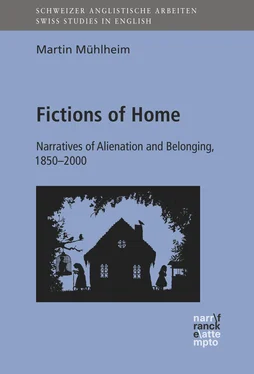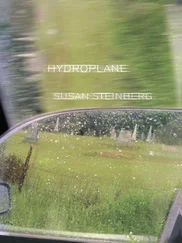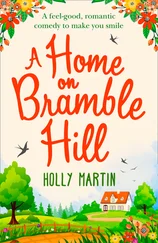The novel’s nostalgicnostalgia longing for stable roots is thus only one of the ways in which The Mill on the Floss expresses deep misgivings about the extent to which the changechanges of the nineteenth century can be seen as progressprogress rather than as destructive forces. Similar worries about a newly emerging, rootless society were to remain a concern in English fiction well into the early twentieth century, as we can see in E.M. ForsterForster, E.M.’s Howards End (1910) . In ForsterForster, E.M.’s novel, the narrator fears that the course of modern societal development will eventually reduce humanity “again to a nomadic horde” (154; ch. 17):
LondonLondon was but a foretaste of this nomadic civilizationcivilization which is altering human nature so profoundly, and throws upon personal relations a stress greater than they have ever borne before. Under cosmopolitanism, if it comes, we shall receive no help from the earth. Trees and meadows and mountains will only be a spectaclespectacle, and the binding force that they once exercised on character must be entrusted to Love alone. May Love be equal to the task! (256–257; ch. 31)
The age of urbanizationurban society and mass-migrationmigration, in this view, constitutes not progressprogress, but a kind of regressionregression to a more primitive, nomadic past. In such a ‘nomadic age,’ where the home is no longer rooted in a specific place, “Love” – or, as Maggie would put it, “the wayward choice of […] passion” (381; bk. 6, ch. 14) – may remain the only binding force in people’s lives.
This fear of an uprooted, nomadic civilizationcivilization in fact also pervades little Maggie’s escapeescape to the gypsiesgypsies, which soon turns into an experience of almost gothic terror:
Her ideas about the gypsiesgypsies had undergone a rapid modification in the last five minutes. From having considered them very respectful companions, amenable to instruction, she had begun to think that they meant perhaps to kill her as soon as it was dark, and cut up her bodybody for gradual cooking; the suspicion crossed her that the fierce-eyed old man was in fact the Devil, who might drop that transparent disguise at any moment, and turn either into the grinning blacksmith, or else a fiery-eyed monster with dragon’s wings. (95; bk. 1, ch. 11)
On the one hand, Deborah Epstein NordNord, Deborah Epstein is surely right in insisting that Maggie’s excessiveexcess hopes and fears in this episode must be read as ironically exposing her childish “myopia and delusions” (16). On the other hand, it would be difficult to argue that Eliot’s novel secretly propagates the gypsiesgypsies’ nomadic way of life as a desirable alternative to the Tullivers’ respectablerespectability, settled existence. Rather, the narrative emphasizes the gypsies’ comparative povertypoverty (“We’ve got no tea nor butter”; 93; bk. 1, ch. 9), suggesting that one ought, perhaps, to pity, but certainly not emulate such a ‘rootless’ existence.
Similarly, The Mill on the Floss foregrounds the threats of rootlessness and nomadismnomadism in Maggie’s relationship to Stephen Guest. For Maggie, abandoning her family and her home communitycommunity to elope with Stephen would mean “for ever [to] sink and wander vaguely, driven by uncertain impulse” (382; bk. 6, ch. 14). Even Stephen’s last name in fact emphasizes that Maggie cannot expect to find a stable home with him, for a ‘guest’ is, by definition, a person who is not staying in his or her own home, but only ever in someone else’s. Moreover, Stephen is the prospective heir of Guest & Co., “a great mill-owning, ship-owning business […], with a banking concern attached” (54; bk. 1, ch. 7), and thus a proponent of the very industrial-capitalistcapitalist order that threatens to erode the ideal of home that Maggie (and, arguably, Eliot’s novel) desperately tries to uphold.128 Put more abstractly, the novel confronts Maggie with the choice between, on the one hand, a negative, personal kind of freedomfreedom from interference by the home communitycommunity (i.e. asserting her right to be with Stephen, over and against the wishes of relativesrelatives, friends, etc.), and, on the other, the positive freedom of belonging to a communitycommunity and participating in its daily life (i.e. remaining accepted and included).129
The Politics of Genre and Style Brought Home
Maggie’s conflictconflict cannot be solved within the realistrealism parameters of the English BildungsromaBildungsromann , and accordingly The Mill on the Floss ultimately abandons the world of realismrealism for the realm of tragic wish-fulfillmentwish-fulfillment and dreamlike dissolution. The prototypical Bildungsroman tells the story of someone who, after leaving home, manages to reconcile his or her own desires with the demands of society – someone who finds a place in the world, albeit at the cost of compromisecompromise. Whenever such a (more or less harmonious) homecoming becomes entirely impossible, we approach the tragic realm of ‘unbelonging’ that is characterized by a breakdown of both the social and the transcendental order. As Terry EagletonEagleton, Terry points out, this tragic realm tends to be associated with “virile warriors and immolated virgins”; it confronts us with scapegoatscapegoat figures who incarnate “the inner contradictionscontradiction of the social ordersocial order” and thus symbolize an entire society’s failure in their own defeat ( Sweet Violence ix and 280).
This idea that inner, hidden contradictionscontradiction are exposed in tragedytragedy also explains why Andrew Bennet and Nicholas RoyleRoyle, Nicholas associate the tragic as such with psychoanalyticpsychoanalysis and psychoanalytic criticism theory: both make the unconscious public (109). FreudFreud, Sigmund himself famously argued that the interpretation of dreamsdreams is “the royal road to a knowledgeknowledge of the unconscious” ( Five Lectures 33), and the fact that the tragic catastrophe in Eliot’s novel constitutes a departure from realismrealism into a land of semi-incestuousincest, death-driven wish-fulfillmentwish-fulfillment is thus merely a more than usually striking example of the secret affinity between tragedy, dreams, and the unconscious.130
Importantly, in The Mill on the Floss the critical exploration of tragedytragedy and other literary concepts is linked explicitly to the novel’s thematic focus on home and dispossession. For instance, in a chapter entitled “What Had Happened at Home,” the narrator describes Mr. Tulliver’s lossloss of Dorlcote Mill, his beloved home, as a “tragedy” both for himself and for the family (as well as the servantsservants and domestics) who depend on him (162–163 and 212; bk. 3, ch. 1 and 8). Similarly, as we have seen, the narrator believes that fashionable ironyirony thrives only in the comfortable homes of the privileged who depend, for their comfort, on those who suffer from want and dispossession. Even the novel’s concern with popular romancesromance, where the dark-haired heroine must always end unhappily, is in fact directly related to the events in Maggie’s own home, for both her parents and other relativesrelatives echo these prejudices in their misgivings about Maggie’s ‘gypsy-like’ dark hair. Literary conventionsconventions and stereotypesstereotypes thus reinforce, and perhaps also create, social prejudices that, in turn, have real repercussions in domestic life. In short, we can say that The Mill on the Floss relates all its three major literary critical concerns – the critique of tragedy, of irony, and of popular romancesromance – to problems of domesticity, home, and belonging, and thus to key themes of the BildungsromanBildungsroman .
Читать дальше












